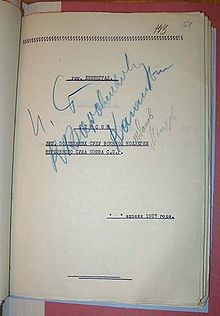Military Collegium of the Supreme Court of the USSR
- Military Collegium of the Supreme Court of the USSR
-
Military Collegium of the Supreme Court of the USSR (Военная коллегия Верховного суда СССР) was created in 1924 to the Supreme Court of the USSR as a court for the higher military and political personnel of Red Army and Fleet. In addition it was an immediate supervisor of military tribunals and the supreme authority of military appeals.
During 1926–1948 the Chairman of the Collegium was Vasili Ulrikh.
The role of the Military Collegium drastically changed since June 1934, when it was assigned the duty to consider cases that fell under Article 58, "counter-revolutionary activity".
During the Great Purge of 1937–1938 the Military Collegium tried relatively prominent figures, usually based on the lists approved personally by Joseph Stalin, the majority of Article 58 cases having been processed extrajudicially by NKVD Troikas. In particular, the Military Collegium conducted the major Soviet show trials.
See also
Wikimedia Foundation.
2010.
Look at other dictionaries:
Supreme Court of the Soviet Union — The Supreme Court of the USSR was the supreme court of the Soviet Union during its existence. The Supreme Court of the USSR included the Military Collegium of the Supreme Court of the USSR and other elements which were not typical of Supreme… … Wikipedia
International Military Tribunal for the Far East — Tokyo Trial redirects here. For the film, see Tokyo Trial (film). International Military Tribunal for the Far East was convened at Ichigaya Court, formally Imperial Japanese Army HQ building in Ichigaya, Tokyo. The International Military Tribunal … Wikipedia
Timeline of the Great Purge — The Great Purge of 1936 1938 can be roughly divided into four periods [http://www.memo.ru/history/y1937/hronika1936 1939/xronika.html N.G. Okhotin, A.B. Roginsky Great Terror : Brief Chronology] Memorial, 2007] :;October 1936 February 1937:… … Wikipedia
Night of the Murdered Poets — On August 12, 1952, thirteen Soviet Jews were executed in the Lubyanka Prison in Moscow, Russia as a result of charges of espionage based on forced, false confessions resulting from coercion and torture.[1] This massacre is known as the Night of… … Wikipedia
David Riazanov — (1870 1938). David Riazanov (Russian: Давид Рязанов), born David Borisovich Goldendakh (Russian: Давид Борисович Гольдендах) (1870 – 1938), was a political revolutionary, Marxist theoretician, and archivist. Riazanov is best remembered as the… … Wikipedia
Moscow Trials — The Moscow Trials were a series of show trials conducted in the Soviet Union and orchestrated by Joseph Stalin during the Great Purge of the 1930s. The victims included most of the surviving Old Bolsheviks, as well as the leadership of the Soviet … Wikipedia
1960 U-2 incident — The 1960 U 2 incident occurred during the Cold War on May 1, 1960 when an American U 2 spy plane was shot down over the Soviet Union. At first, the United States government denied the plane s purpose and mission, but was forced to admit its role… … Wikipedia
Ministry of Justice (Soviet Union) — Ministry of Justice of the USSR Министерство юстиции СССР … Wikipedia
Nikolai Krylenko — People s Commissar for Justice of the USSR In office May 1929 – 5 May 1931 Premier Alexey Rykov Vyacheslav Molotov … Wikipedia
Martemyan Ryutin — Martemyan Nikitich Ryutin (Russian: Мартемьян Никитич Рютин) (1890–1937) was a Russian Marxist revolutionary and a political functionary of the Russian Communist Party. Ryutin is best remembered as the leader of a pro peasant political faction… … Wikipedia

